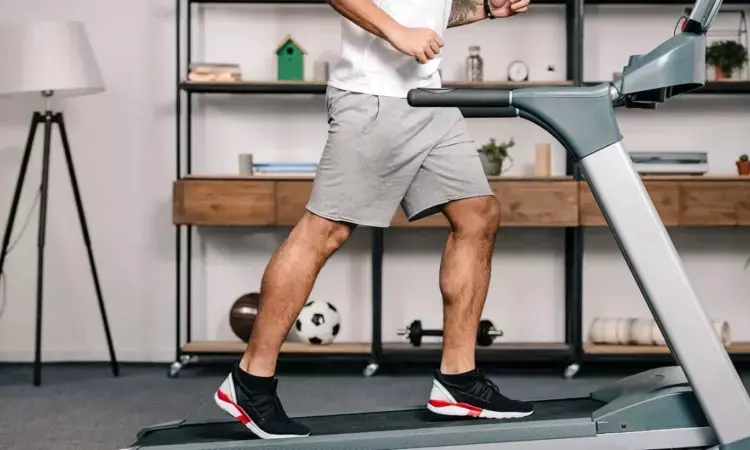- Home
- Medical news & Guidelines
- Anesthesiology
- Cardiology and CTVS
- Critical Care
- Dentistry
- Dermatology
- Diabetes and Endocrinology
- ENT
- Gastroenterology
- Medicine
- Nephrology
- Neurology
- Obstretics-Gynaecology
- Oncology
- Ophthalmology
- Orthopaedics
- Pediatrics-Neonatology
- Psychiatry
- Pulmonology
- Radiology
- Surgery
- Urology
- Laboratory Medicine
- Diet
- Nursing
- Paramedical
- Physiotherapy
- Health news
- Fact Check
- Bone Health Fact Check
- Brain Health Fact Check
- Cancer Related Fact Check
- Child Care Fact Check
- Dental and oral health fact check
- Diabetes and metabolic health fact check
- Diet and Nutrition Fact Check
- Eye and ENT Care Fact Check
- Fitness fact check
- Gut health fact check
- Heart health fact check
- Kidney health fact check
- Medical education fact check
- Men's health fact check
- Respiratory fact check
- Skin and hair care fact check
- Vaccine and Immunization fact check
- Women's health fact check
- AYUSH
- State News
- Andaman and Nicobar Islands
- Andhra Pradesh
- Arunachal Pradesh
- Assam
- Bihar
- Chandigarh
- Chattisgarh
- Dadra and Nagar Haveli
- Daman and Diu
- Delhi
- Goa
- Gujarat
- Haryana
- Himachal Pradesh
- Jammu & Kashmir
- Jharkhand
- Karnataka
- Kerala
- Ladakh
- Lakshadweep
- Madhya Pradesh
- Maharashtra
- Manipur
- Meghalaya
- Mizoram
- Nagaland
- Odisha
- Puducherry
- Punjab
- Rajasthan
- Sikkim
- Tamil Nadu
- Telangana
- Tripura
- Uttar Pradesh
- Uttrakhand
- West Bengal
- Medical Education
- Industry
Low to moderate-intensity exercise may prevent metabolic conditions and atherosclerosis in young people

USA: Compared to no exercise, exercising at low to moderate exercise intensity for 1 h sufficiently attenuated a fat meal-induced postprandial hypertriglyceridemia (PHTG), a recent study published in the Journal of Exercise Science & Fitness has shown. Moderate exercise intensity was also effective in mitigating insulin resistance.
"An acute bout of exercise at 40 %, 60 %, and 70 % VO2 max 12 h before intake of a fat-meal had similar effects on PHTG attenuation," the researchers reported. "Also, there was an improvement in insulin sensitivity among all exercise trials, leading to decreased insulin response to fat-rich meal."
The randomized controlled trial found that compared to no exercise, low-intensity exercise on a treadmill for 1 hour significantly lowered serum triglyceride levels following a fat-rich meal that was ingested 12 hours post-exercise
Cardiovascular disease (CVD) is the foremost cause of death worldwide. Postprandial hypertriglyceridemia is a condition characterized by elevated triglyceride levels after a meal. It is a common lipid abnormality linked to an increased CVD risk.
Previous studies showed that exercising at 40-70% intensities not only attenuates PHTG but also lowers insulin response among physically inactive people with metabolic syndrome. However, there is a need to elucidate the effects of different exercise intensities on insulin resistance and PHTG in healthy individuals (non-hyperlipidemic). Therefore, John Q. Zhang, Department of Kinesiology, The University of Texas at San Antonio, USA, and colleagues aimed to investigate the effects of different exercise intensities on insulin resistance and postprandial lipemia (PHTG) in healthy individuals.
The study included 10 adult males (age = 34 ± 2.8 y, fasting plasma TG = 1.36 ± 0.18 mmol/l, body mass = 72.9 ± 2.4 kg, VO2max = 43.7 ± 3.0 ml/kg/min, fasting Homeostatic Model Assessment for Insulin Resistance (HOMA2-IR) = 1.7 ± 0.3, and fasting glucose = 5.2 ± 0.2 mmol/l) with normal fasting triglyceride (TG) concentrations.
Each participant performed a control trial (Ctr, no exercise), and three exercise trials at 40 % (40%T), 60 % (60%T), and 70 % (70%T) of their VO2 max. In the exercise trials, participants jogged on a treadmill for one hour at a designated intensity. Each participant consumed a fat-rich meal 12 hours after exercise. Blood samples were taken at 0 h (before the meal), and 2 h, 4 h, 6 h, 8 h, and 24 h after the meal. After the meal, they analyzed the plasma TG, HOMA2-IR, and area score under the TG concentration curve over an 8 period (TG tAUC).
The study led to the following findings:
- At 2 h, 4 h, and 6 h after the meal, TG in all exercise trials was lower than Ctr but did not differ.
- All the exercise trials were lower in TG tAUC scores than Ctr, but differences were not observed among the exercise trials.
- Compared to Ctr, a significant difference in HOMA2-IR in both 60 % T and 70 % T was observed, but not in 40 % T.
"These findings indicate that exercising at low to moderate intensity may be sufficient in preventing metabolic conditions and atherosclerosis among young, healthy, and recreationally active individuals," the researchers wrote.
"These results may provide exercise-oriented health promotion measures for communities with healthy and at-risk individuals," they concluded.
Reference:
Ji, L. L., Fretwell, V. S., Escamilla, A., Yao, W., Zhang, T., He, M., & Zhang, J. Q. (2023). An acute exercise at low to moderate intensity attenuated postprandial lipemia and insulin responses. Journal of Exercise Science & Fitness, 22(1), 14-22. https://doi.org/10.1016/j.jesf.2023.10.006
Dr Kamal Kant Kohli-MBBS, DTCD- a chest specialist with more than 30 years of practice and a flair for writing clinical articles, Dr Kamal Kant Kohli joined Medical Dialogues as a Chief Editor of Medical News. Besides writing articles, as an editor, he proofreads and verifies all the medical content published on Medical Dialogues including those coming from journals, studies,medical conferences,guidelines etc. Email: drkohli@medicaldialogues.in. Contact no. 011-43720751


